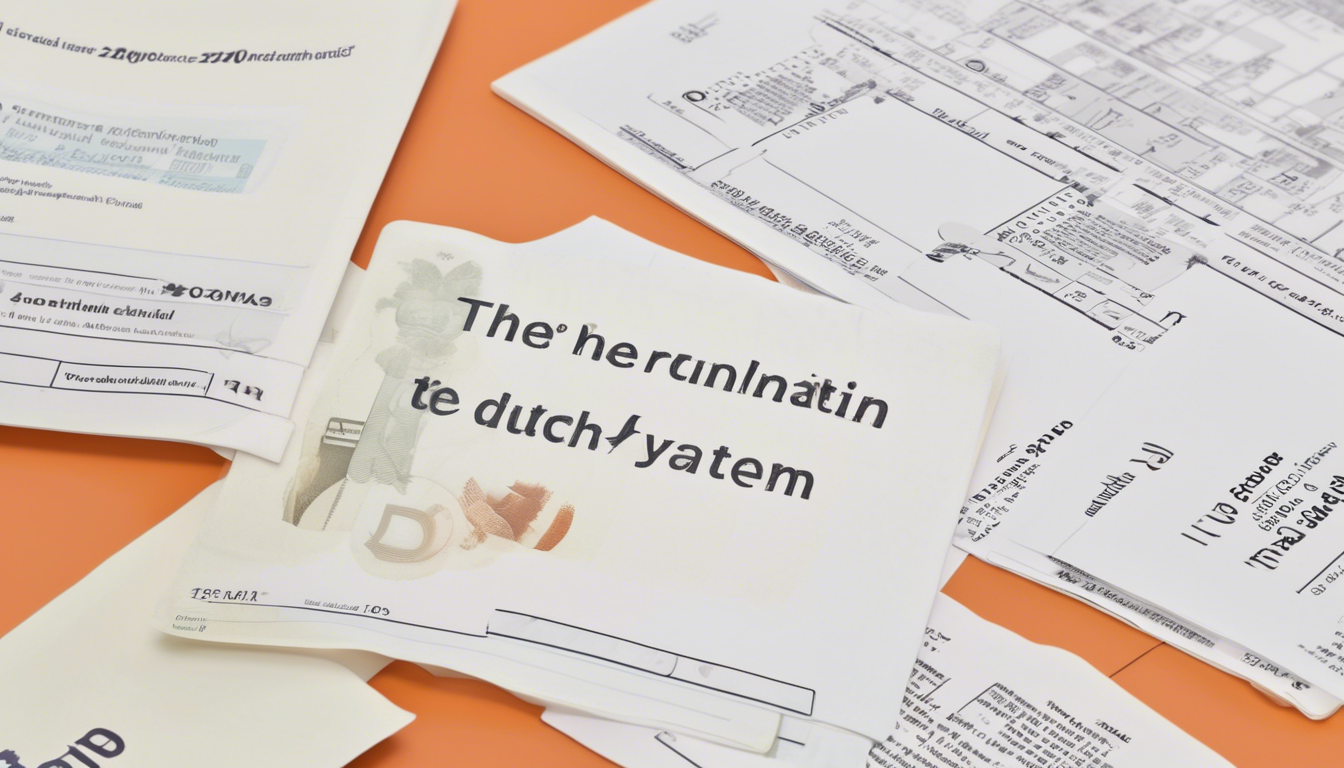Understanding The Dutch Tax System For Expats

Navigating the Dutch Tax System for Expats: Key Considerations
Moving to a new country can be thrilling, but it also comes with its own set of challenges, particularly when it comes to understanding the tax system. If you’re an expat in the Netherlands, getting a grasp of the Dutch tax system is vital for your financial health. Here are some key considerations to help you navigate this complex landscape.
Understanding Residency Status
Your residency status plays a critical role in how you’re taxed in the Netherlands. Generally, the Dutch tax system distinguishes between residents and non-residents. As a resident, you will be taxed on your worldwide income, including income from abroad. If you’re classified as a non-resident, you’re only taxed on income sourced from the Netherlands.
Tax System Structure
The Dutch tax system consists of several components:
- Income tax: You pay taxes based on different income brackets, with rates that increase as your income rises.
- Value Added Tax (VAT): This is a consumption tax applied to most goods and services.
- Municipal taxes: Local governments impose additional taxes, which vary based on your municipality.
- Property tax: If you own property in the Netherlands, expect to pay taxes on its value.
Filing Your Tax Return
In the Netherlands, the tax year coincides with the calendar year. Usually, by March 1st, the Dutch Tax Authority (Belastingdienst) will send you a tax return form. Here’s what you need to do:
- Review the pre-filled information.
- Add any other income or deductions.
- Submit your return by May 1st for the previous year’s income.
Keep in mind that failing to file on time can result in penalties. Therefore, staying organized and adhering to deadlines is crucial.
Tax Benefits and Deductions
One of the perks of living in the Netherlands as an expat is the possibility of benefiting from tax deductions and allowances. Here are a few that might apply:
- 30% ruling: If you’re a highly skilled migrant, you may qualify for this tax exemption, allowing you to keep 30% of your salary tax-free.
- Mortgage interest deductions: If you have a mortgage, you can deduct the interest paid from your taxable income.
- Healthcare costs: Some medical expenses may be partially deductible based on your income.
It is advisable to consult a tax advisor who understands the Dutch system and can guide you through which deductions apply to your situation.
Paying Taxes
Your employer typically withholds taxes from your salary, which can simplify the payment process. However, if you have additional income streams like freelance work, you’ll need to make sure that you handle these taxes separately.
International Tax Treaties
If you have income sourced from your home country or other locations, understanding international tax treaties is crucial. The Netherlands has tax treaties with many nations to prevent double taxation. This means you could avoid paying taxes on the same income in both countries. Always check whether the tax treaty between the Netherlands and your home country can reduce your tax burden.
Getting Professional Help
Understanding the intricacies of the Dutch tax system for expats can be overwhelming. Hiring a tax consultant who specializes in expat taxes can save you time and money. They can help you optimize your tax situation and ensure compliance with local laws.
Navigating the Dutch tax system doesn’t have to be daunting. By understanding your residency status, being aware of your obligations, and making use of available deductions, you can effectively manage your finances while enjoying your time in the Netherlands. Remain informed about changes to tax laws and seek professional assistance whenever necessary to keep your tax matters in order.
Understanding the 30% Ruling: Tax Benefits for Expats
Living as an expat can be exciting, but navigating the Dutch tax system might seem daunting at first. One of the most beneficial aspects of this system for expats is the 30% ruling. This tax advantage can provide significant financial relief, so understanding it is crucial for anyone moving to the Netherlands.
The 30% ruling allows qualified expats to receive 30% of their gross salary, tax-free. This means that only 70% of your earnings will be subject to Dutch income tax, which can lead to substantial savings. If you’re considering a move to the Netherlands or have recently relocated, here’s what you need to know about this tax benefit.
Eligibility for the 30% Ruling
Not everyone can benefit from the 30% ruling. To qualify, you must meet specific criteria:
- You must work in the Netherlands and hold a valid work contract.
- Your employer must be based in the Netherlands.
- You must have moved from outside the Netherlands.
- Your previous home must be at least 150 kilometers from your new workplace.
- Your skills must be in demand. There may be a minimum salary requirement, which can change annually.
It’s also important to note that you need to apply for the 30% ruling within four months of starting your work in the Netherlands. If you apply later, you might miss out on earlier tax benefits.
Applying for the 30% Ruling
To start enjoying the tax relief, you must submit an application to the Dutch tax authorities. Your employer can assist you with this process. Here’s a simplified step-by-step approach:
- Gather necessary documents such as your employment contract, proof of previous residency, and any evidence showing your skills are in demand.
- Fill out the application form, which is available on the Dutch tax authority’s website.
- Your employer must sign off on the application to confirm your employment and the nature of your work.
- Submit your application within the 4-month deadline to maximize your benefits.
After submission, the tax authorities will review your application. You will receive a determination letter indicating whether you qualify for the ruling.
Benefits of the 30% Ruling
The financial advantages of the 30% ruling extend beyond mere salary tax relief. Here are some key benefits:
- Increased Take-Home Pay: With 30% of your salary exempt, you can enjoy a higher disposable income.
- Tax-Free Compensation: Certain indemnities provided by your employer, such as housing cost allowances and relocation expenses, may also be tax-free.
- Retirement Contributions: Exemptions can apply to contributions made for employee benefits, creating further savings opportunities.
- Flexible Tax Deductions: While on the 30% ruling, you may be able to deduct certain expenses that would otherwise be taxable.
These benefits make the 30% ruling an advantageous option for many expats living in the Netherlands.
Duration of the 30% Ruling
The ruling is granted for a maximum period of five years. However, this duration can vary based on your experience, employment conditions, and prior use of the ruling in previous employments. If your circumstances change—such as changing jobs or salary levels—it’s vital to keep the tax authorities informed to ensure you retain the benefits.
Should you leave the Netherlands before the five years are up, the 30% ruling will end with your departure. Make sure to account for this to effectively manage your finances.
Final Thoughts
Understanding the 30% ruling can profoundly affect your financial well-being as an expat in the Netherlands. By taking the necessary steps to apply and qualify, you can unlock significant tax benefits that make life in a new country much easier. Always consider consulting with a tax professional to ensure that you maximize your benefits and stay compliant with tax regulations.
As you navigate your expat journey, being informed about these tax advantages will give you more time to enjoy what this beautiful country has to offer.
Common Tax Deductions and Credits Available to Expats in the Netherlands
Understanding the Dutch tax system can be a daunting task for many expats. However, being aware of the common tax deductions and credits available can greatly help in managing your finances while living in the Netherlands. Expats can benefit from specific tax regulations, making their transition smoother and their financial planning more efficient.
One key aspect of the Dutch tax system is the 30% ruling, which allows expats to receive a tax exemption on 30% of their gross salary. This ruling is designed to attract skilled workers from abroad and can significantly reduce your taxable income. To qualify, you must meet certain criteria, including working in a profession that is in demand in the Netherlands.
Common Tax Deductions for Expats
As an expat, you may be eligible for several deductions that can lower your taxable income. Here are some common tax deductions to consider:
- Work-Related Expenses: If you incur expenses directly related to your job—such as travel costs to and from work, work clothing, or tools—you can claim these as deductions.
- Health Insurance Premiums: In the Netherlands, you are required to have health insurance. The premiums you pay may be deductible, which can ease your financial burden.
- Educational Expenses: If you take courses or workshops to enhance your professional skills, these costs may also be deductible, provided they are necessary for your job.
- Donations: Charitable contributions that meet specific criteria can be deducted, allowing you to support causes you care about while also benefitting from tax relief.
Tax Credits Available to Expats
In addition to deductions, the Netherlands offers various tax credits that can further reduce your tax liability. Here are a few notable ones:
- General Tax Credit: This is a basic credit aimed at reducing the amount of tax you owe. It applies to all taxpayers, including expats, and is based on your income level.
- Labor Tax Credit: If you are employed and earning a salary, you may qualify for this credit, which is designed to support working individuals.
- Child Tax Credit: If you have children, you may be eligible for additional tax benefits. This credit helps offset the costs of raising children and supports families living in the Netherlands.
Filing Your Taxes
Filing your taxes as an expat may seem overwhelming, but it doesn’t have to be. The Dutch tax system allows you to file your taxes online, making it easier and more accessible. Here are steps to simplify the process:
- Gather Your Documents: Collect documents such as your income statements, any relevant deductions, and personal identification.
- Register with the Dutch Tax Office: Ensure you are registered with the Belastingdienst (Dutch Tax Office) to receive all necessary information regarding your tax obligations.
- Submit Your Tax Return: Use the online portal to fill out and submit your tax return before the deadline. Make sure to include all deductions and credits you qualify for.
Tips for Maximizing Deductions and Credits
Taking advantage of available deductions and credits can save you a significant amount of money. Here are some tips to ensure you maximize your tax benefits:
- Stay Informed: Tax laws change frequently, so keep yourself updated on the latest regulations and available deductions.
- Consult a Tax Professional: If the process feels too complicated, don’t hesitate to seek help from a tax advisor who specializes in expat taxes.
- Document Everything: Keep detailed records of your expenses and receipts, as they will be essential if you decide to claim deductions.
Understanding the common tax deductions and credits available to you as an expat in the Netherlands can empower you to make informed financial decisions. By leveraging these opportunities, you can enjoy a smoother financial experience while residing in this beautiful country.
How to File Your Taxes as an Expat: A Step-by-Step Guide
Filing your taxes as an expat can be a bit tricky, especially if you’re not familiar with the tax laws of your home country and your host country. However, with the right guidance, you can navigate the process smoothly and ensure compliance. Here’s a step-by-step approach to help you through it.
Gather Necessary Documents
- Your income statements (like W-2 forms or pay stubs)
- Any bank interest statements and investment income
- Records of foreign income sources
- Proof of residency and travel (like entry and exit stamps)
- Tax identification numbers from both home and host countries
Start by collecting all the documents you will need. This includes income statements, interest records, and any other necessary paperwork. The more organized your information is, the easier it will be to complete your tax filings.
Determine Your Tax Residency Status
Next, you need to determine your residency status. Most countries have specific rules that define whether you’re considered a tax resident or non-resident. Typically, this is based on:
- The number of days you’ve spent in the country
- If you have a permanent home or a center of vital interests in the country
- Other residency criteria set by your home and host country laws
Understanding your residency status is crucial because it affects how you file your taxes. Tax residents usually have to report worldwide income, while non-residents may be taxed only on income earned in the host country.
Understand Tax Treaties
Research whether there’s a tax treaty between your home country and the country where you live. Tax treaties can help avoid double taxation and may offer specific exemptions. Check the details of the treaty and understand how it applies to your situation.
Choose the Right Tax Filing Method
If your income is quite straightforward, you might opt for filing your taxes yourself using online tax software designed for expats. Alternatively, if your situation is complicated, hiring a tax professional with experience in expat tax scenarios may be a beneficial choice. They can help you make sense of complex laws and ensure compliance.
When choosing to file your own taxes, consider these options:
- Online tax software: Tools that simplify the filing process.
- Hiring a tax professional: Looking for someone with expat tax knowledge can save you a lot of headaches.
Complete Your Tax Forms
Once you have gathered all the information and chosen your filing method, it’s time to complete your tax forms. Be sure to fill in all required fields accurately. Missing information can lead to delays or errors in processing your tax return.
If you’re filing in your home country, you may need to fill out specific forms for reporting foreign income. For instance, US expats often use Form 1040 along with Form 2555 to declare foreign income and claim the Foreign Earned Income Exclusion.
Review and Submit
After filling out the forms, review everything carefully. Double-check for any errors or missing information. It’s advisable to keep a digital and paper copy of your tax return and all documents submitted for your records.
When you’re ready, submit your tax return either electronically or by mail, depending on the requirements of your home country. If you’re unsure about any part of the submission, consulting a tax professional might be a wise choice.
Stay Informed About Deadlines
Pay attention to tax deadlines in both your home and host countries. Failing to file on time can result in penalties or interest charges. Many countries offer extensions, but it’s crucial to understand those rules to avoid surprises.
A good practice is to set reminders for yourself about important dates. Mark the deadlines on your calendar and create a filing schedule to ensure you’re always prepared.
Monitor Changes
Be vigilant about changes in tax laws and regulations. Tax laws can change yearly, and staying informed will ensure your next tax season goes smoothly. Follow relevant expat communities or subscribe to newsletters that provide updates on tax laws affecting expats.
Filing your taxes as an expat could seem overwhelming, but breaking it down into manageable steps makes it far simpler. By organizing your documents, understanding your residency status, and being aware of tax treaties, you will be well-equipped to handle your tax responsibilities efficiently.
The Importance of Tax Treaties: Avoiding Double Taxation in the Netherlands
Expats living and working in the Netherlands can face various tax obligations. However, understanding how tax treaties can prevent double taxation is crucial for maintaining financial health. Double taxation happens when two different jurisdictions tax the same income. Fortunately, the Netherlands has numerous tax treaties in place that help mitigate this issue, allowing expats to keep more of their hard-earned money.
The primary purpose of tax treaties is to define residency and establish which country has the right to tax specific types of income. Without these treaties, expats could find themselves in a complicated situation, owing taxes in both their home country and the Netherlands. By recognizing the importance of these agreements, you can better manage your financial affairs while living abroad.
How Tax Treaties Work
Tax treaties create a systematic way to avoid double taxation. They typically outline:
- Tax Residency: Determines which country may define you as a tax resident.
- Tax Rates: Establishes reduced withholding tax rates for income types like dividends, interest, and royalties.
- Credit for Taxes Paid: Allows for tax credits in your home country for taxes paid to the Netherlands, reducing your overall tax liability.
To benefit from these treaties, you often need to provide documentation proving your residency in the Netherlands or in your home country. Collecting these documents can save you substantial amounts of money, as well as avoid the headaches logistics involved in dealing with tax authorities on both sides.
Countries with Tax Treaties
The Netherlands has signed treaties with more than 90 countries. Some notable countries include:
- United States
- United Kingdom
- Germany
- France
- India
This wide array of agreements means that many expats can benefit from reduced tax obligations. However, it’s essential to check the specifics of each treaty, as terms can differ significantly. For instance, some treaties might exempt certain income while others may allow for reduced taxation at source.
Claiming Treaty Benefits
To take advantage of treaty benefits, you generally need to fill out specific forms and submit them to the tax authorities in either your home country or the Netherlands. It often involves:
- Identifying the applicable treaty: Review the details to see if it applies to your situation.
- Gathering necessary documentation: Documents proving your tax status and residency will be essential.
- Filing appropriate forms: Use the required forms to claim credits or exemptions as dictated by the treaty.
These steps might seem overwhelming, but understanding the process is foundational to optimizing your tax situation.
Risks of Not Utilizing Tax Treaties
Failing to utilize available tax treaties can result in:
- Paying more tax than necessary, reducing your disposable income.
- Facing tax audits and penalties from either jurisdiction.
- Complex financial situations that could lead to unintended consequences.
As an expat, being proactive about your tax responsibility is vital. Keep accurate records and seek advice when needed. Engaging with a tax advisor familiar with international tax laws can streamline the process and help you save money in the long run.
Final Thoughts
The importance of tax treaties cannot be overstated. By ensuring that you understand your tax obligations and the benefits that these treaties offer, you can effectively manage your financial situation in the Netherlands. Engaging with experts, maintaining organized documentation, and familiarizing yourself with relevant treaties will significantly enhance your expat experience. Knowing how to navigate these tax agreements allows you to fully enjoy your time in this beautiful country, without the unnecessary burden of double taxation weighing you down.
Conclusion
Navigating the intricacies of the Dutch tax system can seem daunting for expats, but understanding its key components significantly eases the process. Knowing the essentials, such as the benefits of the 30% ruling, allows you to optimize your tax situation and retain more of your earnings. Take advantage of common tax deductions and credits, which can further lighten your financial load, especially as you settle into your new life in the Netherlands.
Filing taxes as an expat doesn’t have to be overwhelming. By following a clear, step-by-step guide, you can ensure that your taxes are submitted accurately and on time. It’s also critical to recognize the importance of tax treaties, which help prevent double taxation. This means you can focus more on enjoying your overseas adventure without the stress of potential tax burdens.
As you navigate this new terrain, remember that engaging with local tax professionals or resources can provide invaluable support. They can help clarify any nuanced questions and guide you through the processes to keep your finances compliant with Dutch laws. You’re not alone on this journey; many others have successfully adjusted to the Dutch tax landscape. By arming yourself with the right knowledge and tools, you can make informed decisions and truly thrive as an expat in the Netherlands.





